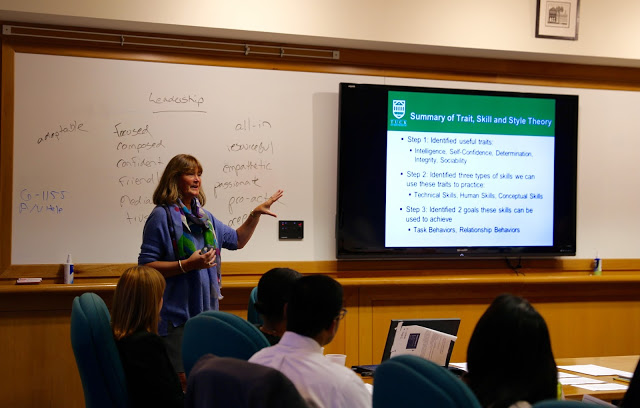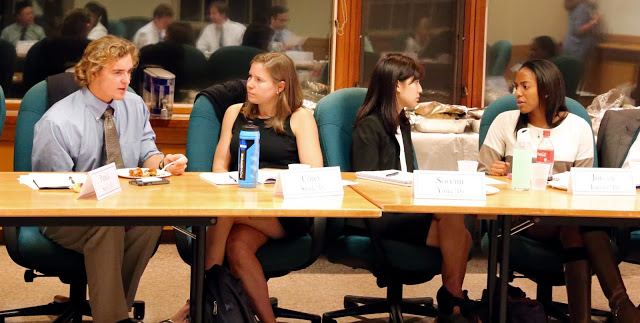On September 24th, the Rockefeller Leadership Fellows welcomed Professor Betsy Winslow ’83 to speak about “Leadership, Personal Development, and the Feedback Cycle.” Professor Winslow has spent a great deal of time in Hanover previously as a student and the Associate Director of Undergraduate Admissions, and currently as an Adjunct Assistant Professor of Business Administration and Associate Director of the MBA program at the Tuck School of Business. Having received masters and doctoral degrees in education, Professor Winslow currently researches leadership development, leadership theory and organizational behavior. During the session, she dedicated her time in summarizing academic leadership theory and introducing best practices for giving feedback.
Professor Winslow started the session with an introspective activity: she asked the fellows to describe a time when they had recently demonstrated leadership. The fellows responded with words such as focused, empathetic, proactive, passionate, and trusting. A few fellows also shared personal experiences with leadership.
Professor Winslow continued the session by giving her response to what leadership is. She argued that effective leadership is achieving excellence in four distinct categories: personal excellence, effective situational control, motivating and developing people, and achieving results. She methodically worked through each section, presenting both theoretical basis and real-life examples. One of the main takeaways from her session was that it was important for a leader to adjust their behavior in different situations by identifying everyone's and make a deliberate, constructive and effective choice.
 |
| Professor Betsy Winslow '83 explains the four different categories of leadership. Photo by Abigail Chen '17. |
The next portion of the evening focused on the application of giving and receiving feedback. We explored this topic through a role-play exercise in pairs. Feedback must be given under the right conditions, with a great deal of focus and purpose, and refer back to concrete and observable behavior. The provider must gather tangible data and check for any assumptions, while the receiver must listen objectively and calmly, and ask clarifying questions. If a provider offers assistance, and a receiver says “thank you,” then a feedback session has been successful! For this task, the fellows were given one of three intentionally poor scenarios of feedback. Our goal was to rewrite them to give more constructive, positive, and supportive feedback by using the SMART framework (Specific, Measureable, Actionable, Relevant, and Timely) and SBIR language (explain the Situation, describe the Behavior, explain the Impact, outline the Result).
 |
| The Rockefeller Leadership Fellows practice giving each other effective feedback. Photo by Abigail Chen '17. |
The feedback workshop was helpful as it gave us a sense of best feedback practices, an essential leadership skill. We will work on developing this skill further and apply it in our everyday life as students. I feel confident that we fellows will find ourselves returning to Professor Winslow’s wise words in the future!
-Written by Grace Benjamin '16, Rockefeller Leadership Fellow
This ongoing series explores sessions of the Rockefeller Leadership Fellows (RLF) program. RLF provides fellows with resources in leadership theories and practical skills. Selected their Junior Spring, these Seniors take part in the workshops, dinner discussions, and team-building exercises as they gain a better understanding of the qualities and responsibilities necessary for leaders and successful leadership styles.

